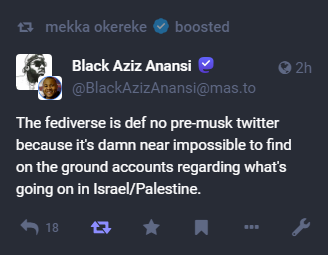Posts
163Following
390Followers
312Microsoft, quietly, has published a guide on how to download and install Linux.
No... Seriously... It is not a joke...
https://learn.microsoft.com/en-us/linux/install
The article was published September 29, 2023 (9 days ago).
The guide provides every option available, too. Starting with using their Windows Subsystem for Linux (WSL), to using a Virtual Machine, and even on "Bare Metal" alongside Windows.
That's right, Microsoft now tells you how to dual-boot Linux. 🤯
Shoq
shoq@mastodon.socialWhich is no surprise to those of us who have been trying to tell early fediverse settlers that discovery has to be prioritized over safety. Unless we can find news and information to begin with, finding it safely becomes moot. Bluesky clearly gets this, which is why the big news accounts are now starting to gravitate there. If the fediverse doesn’t improve in that regard, it will soon become the Linux of social media. Beloved by thousands, ignored by millions.
Source: …
Joe Brockmeier (@jzb)
jzb@mastodon.socialWhat do #Linux books fail to cover that you'd like to see in a book? What is covered too much? (Please boost for reach, I'd love to get a lot of feedback on this if possible.) #OpenSource #Documentation
Charlie Loyd
vruba@everything.happens.horseDear software people,
Unicode is older now than ASCII was when Unicode was introduced. It’s not a weird new fad.
It’s complicated but so is the domain it represents. We recognize that we have to think about time zones and leap days and seconds, for instance. And it’s a cleaner abstraction when you aren’t halfhearted about it.
Sincerely,
Charlie
Kernel Recipes
KernelRecipes@fosstodon.orgVideos are finally online! We hope you will enjoy it!
Thanks you to our great speakers and our sponsors
Big thumbs up to @_syam for the audio/video, Frank Tizzoni for the caricature, Emma Tizzoni for our new mascot, @Aissen for the live blog, @erwanaliasr1
https://www.youtube.com/playlist?list=PLQ8PmP_dnN7Ida3J3tzO-yqrxuF-yEQtI
beka valentine
beka_valentine@kolektiva.socialyou know the @pluralistic episode of XKCD? do you remember what it's about or just that it has a Cory Doctorow joke in it?
because you should read it. it was fucking prescient.
Sven Slootweg (soft-deprecated)
joepie91@pixie.townShow content
Let's do a round-up of a couple!
THE LIBRARY OF ALEXANDRIA
The burning down of this library is often seen as one of the biggest losses of culture in history. In reality, it seems that the library mostly stored copies of works, and while big, it stored very few *unique* things - therefore, not much was actually lost.
THE BYSTANDER EFFECT
The claim is that when there are many bystanders of an incident, none will take responsibility. This is based on the murder of Kitty Genovese, where it was claimed that there were many witnesses, but none of them did anything.
That's false - in fact, the amount of witnesses was limited due to the location, and multiple people alerted the police, but the police failed to respond in a timely manner. More recently, research into the bystander effect suggests that the entire theory is wrong - people *do* consistently come to the aid of others.
THE STANFORD PRISON EXPERIMENT
Claimed to 'prove' that given power, people will turn malicious and start abusing others. In reality, the experiment was fraudulent, and proved no such thing - the guard in the experiment were actively *encouraged* by the researcher to be abusive.
THE BROKEN WINDOW THEORY
This is often seen as some sort of 'scientifically proven fact' about human behaviour; if you leave vandalism or other "anti-social" behaviour untreated, it will invite more of it.
In reality, this was just made up by a cop in New York, never proven, and used as a justification for violent and oppressive policing tactics. There's no evidence that this is true, or ever was.
THE TRAGEDY OF THE COMMONS
This theory claims that when a group of individuals are given access to a common shared resource, they will each act selfishly and collectively exhaust the resource, whereas it would've been fine if one party controlled access. Usually reference over-grazing.
In reality, this concept (in its current form) comes from a thought experiment where it was just *assumed* to be true, rather than from actual research; and instead there is a long history of shared resources being effectively collectively managed without giving any one party total control over access or distribution.
This doesn't stop authoritarians from using the tragedy of the commons as a justification for their accumulation of power; claiming that otherwise, the resources would be exhausted.
STOCKHOLM SYNDROME
This theory claims that victims of crime and/or abuse will develop an irrational attachment to the perpetrator, implying that they can no longer be trusted to have agency in determining how to deal with the situation.
In reality, rather than being based in rigorous research, this concept was coined by a criminologist based on a single bank robbery in (as the name implies) Stockholm.
Crucially, the victims were quite clear about the reason for their trust towards the robbers; the police were acting irresponsibly in this incident, endangering people unnecessarily, and therefore the robbers were the more rational and less dangerous party in the conflict. Not quite the 'irrational attachment' that's so often claimed...
krig
krig@goto.liten.appPerhaps the most insightful part of https://davidgraeber.org/articles/punching-the-clock/:
"Historically, human work patterns have taken the form of intense bursts of energy followed by rest. [...] This is typical of how human beings have always worked. There is no reason to believe that acting otherwise would result in greater efficiency or productivity. Often it has precisely the opposite effect."
Toke Høiland-Jørgensen
toke[Moved] Polychrome
polychrome@cybre.spaceOh my goodness I've just learned a thing about The Matrix that causes it to make a lot more sense: In the original script the humans were used as neural network compute clusters by the Machines and as a crucial component of The Matrix itself.
Which is why humans who were aware of the simulation could control aspects of The Matrix - their minds were part of its foundation.
Unfortunately the test audiences had trouble understanding this concept so the studio changed the human role to "batteries".
Toke Høiland-Jørgensen
tokeYeah, this is a tricky one! The reverse can also be an issue: for instance, I often feel bad for asking (potential) contributors to do more work when I ask them to rework stuff. I usually do so anyway, and don't write a fix myself until they've had a chance to do that (which some do and some don't).
Kernel Recipes
KernelRecipes@fosstodon.orgUnderstand first laws of Physics
@paulmckrcu #kr2023
Mandu 🥟
yurnidiot@mstdn.socialSue is Writing Solarpunk 🌞🌱
susankayequinn@wandering.shopWhatever it takes to get people to understand.
Per Axbom
axbom@axbom.me« In its approach to these matters, this is a work of criticism. If it were literary criticism, everyone would immediately understand that the underlying purpose is positive. A critic of literature examines a work, analyzing its features, evaluating its qualities, seeking a deeper appreciation that might be useful to other readers of the same text. In a similar way, critics of music, theater, and the arts have a valuable, well-established role, serving as a helpful bridge between artists and audiences. Criticism of technology, however, is not yet afforded the same glad welcome. Writers who venture beyond the most pedestrian, dreary conceptions of tools and uses to investigate ways in which technical forms are implicated in the basic patterns and problems of our culture are often greeted with the charge that they are merely "antitechnology" or "Blaming technology." All who have recently stepped forward as critics in this realm have been tarred with the same idiot brush, an expression of the desire to stop a much needed dialogue rather than enlarge it. If any readers want to see the present work as "antitechnology," make the most of it. That is their topic, not mine.
What does interest me, however, is identified in the book's subtitle: A Search for Limits. In an age in which the inexhaustible power of scientific technology makes all things possible, it remains to be seen where we will draw the line, where we will be able to say, here are possibilities that wisdom suggests we avoid. I am convinced that any philosophy of technology worth its salt must eventually ask, How can we limit modern technology to match our best sense of who we are and the kind of world we would like to build? In several contexts and variations, that is my question throughout. »
Mario Zechner
badlogic@mastodon.gamedev.placeToday was ... interesting. If you followed me for the past months over on the shitbird site, you might have seen a bunch of angry German words, lots of graphs, and the occassional news paper, radio, or TV snippet with yours truely. Let me explain.
In Austria, inflation is way above the EU average. There's no end in sight. This is especially true for basic needs like energy and food.
Our government stated in May that they'd build a food price database together with the big grocery chains. But..
Leave me alone 






winter@translunar.academy
tips for being more #positive about your work!
❌ “I can’t fix this bug no matter what I try”
✔ “I am an avant-garde software artist”
❌ “my code won’t compile”
✔ “this is an abstract piece”
❌ “I never get around to implementing any of the features I want”
✔ “I consider myself a minimalist“
❌ “sorry I forget to document my code…”
✔ “my art is about the journey, not the destination”
❌ “I have never finished a project”
✔ “I prefer to leave the ending open to interpretation”
❌ “sorry, this software is not compatible with ( )”
✔ “here I have chosen to make a political statement against ( )”
❌ “this memory leak causes the program to crash”
✔ “this program symbolizes the transience of mortality and reminds us all what is important in life”
Ada Palmer
adapalmer@wandering.shopWhen facing the "All we need is STEM!" approach to education, my usual response is:
Developing the vaccine was the STEM problem; distribution & getting shots in arms was the Social Science problem; getting people to trust it & combatting misinformation was the Humanities problem -- which did we fail?






